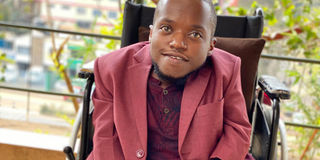My doctors thought I would not live past 15

Joseph Ombogo Nyauncho, 30, lives with oesteogenesis imperfecta or popularly known as brittle bone disease.
What you need to know:
- I am told that I cried incessantly after birth and the doctor while examining me suggested an x-ray test. He discovered that I had fractures on the legs and thighs.
- That’s when I was diagnosed with brittle bone disease. I had to be in casts.
- Although OI is mostly hereditary, this was the first time my parents had heard about the condition.
There are two things Joseph Nyauncho wishes he could do for pleasure: skydive and shoot a gun.
The 30-year-old web administrator can’t check these two items off his bucket-list because he was born with Osteogenesis imperfecta (OI) or brittle bone disease. People with this condition have bones that break easily, sometimes from mild trauma and other times, with no apparent cause.
“I am told that I cried incessantly after birth and the doctor while examining me suggested an x-ray test. He discovered that I had fractures on the legs and thighs. That’s when I was diagnosed with brittle bone disease. I had to be in casts.”
Although OI is mostly hereditary, this was the first time his parents had heard about the condition. “In my Kisii community, when a child is born, it calls for a celebration. Family and friends visit to hold the new-born. In my case, this did not happen because my parents had to be very careful about how I was held. My mother tells me that some people took offence. Without the knowledge of OI, they wondered why my parents denied them the joy of holding their new-born.”
His mother carried him from one crusade to another, hoping for a miracle.
“When it did not happen, they accepted me unconditionally. My father has contributed a lot to who I am today through his wise counsel. He taught me always to think ahead of the bigger picture in everything I wish to undertake and be a leader.”
Strong business acumen
Apart from his web administrator job, Joseph also runs an online electronic sale business called Fair Trade as well as an initiative which seeks to empower Persons living with disabilities in Nyamira County, his home county.
“One of my strengths is that I have strong business acumen. Whether it is in tendering or running the online store, I am quick to understand how a business runs and how to take advantage of the various risks and opportunities on the way. I draw my business inspiration from one of my cousins, Peter Mouni, who runs a branding business, and Chris Kirubi. I aspire to be a business magnate.”
When he was 10, doctors said he would not live to see his 15th birthday.
“I had multiple fractures on my body, and they had no hope in me.”
His parents had enrolled him to a regular school.
“I had to be accompanied by help during the first term. Then teachers took over, and they would carry me in and out of class in turns. At 10, a manual wheelchair was donated to me. My then classmates would push me.”
Being on a wheelchair created a buzz within the school, and some students saw it as an opportunity to play with it. There were many falls and that is how he acquired the fractures that had his doctors alarmed.
Self-pity not an option
“Looking back, I am grateful that throughout my academic life, I was enrolled in schools with typically developing children. To fight for the position of one of the best performing learners, I realised that self-pity was not an option. However, my parents, teachers and some of my relatives had guided me away from that path,” says the computer science graduate from Nazarene University.
At his workplace, he shares that his employer and colleagues are very supportive.
“I like to talk about my workplace because, after my internship with the company, they gave me a job offer and trusted me with the responsibility of web administration,” he says citing that for persons living with disabilities, such opportunities do not always come by easily.
This is partly one of the reason he decided to start an initiative dubbed, Nyauncho and Friends to mentor and support people with disabilities.
“I decided to run the program in the rural area because most of them lack access to information. With the support of my friends, I offer them financial support and information- how do they apply for tenders? How do they get past self-pity and unnecessary compassion from other people? I have experienced this before, and it makes me feel bad. For instance, there are many occasions when waiting to cross to the other side of the street; people have offered me money. They usually think ‘he is on a wheelchair, and he is a beggar.’ Honestly, that hurts me.”
As he grows older, cases of fractures have become fewer, although he still cannot engage in strenuous activities. “There has been a lot of progress because now I can do many things by myself and use an electric wheelchair, so I do not have to depend on other people to push me around.”





